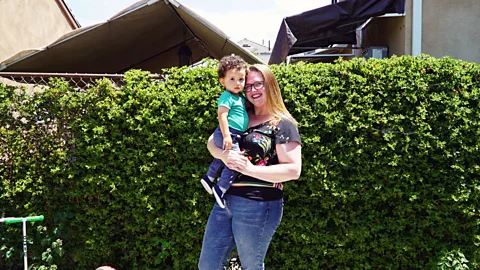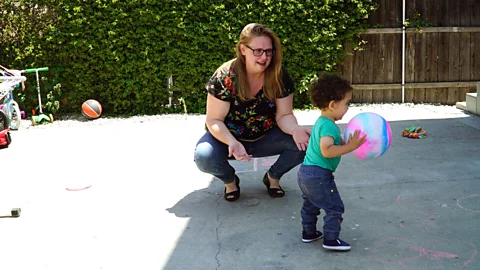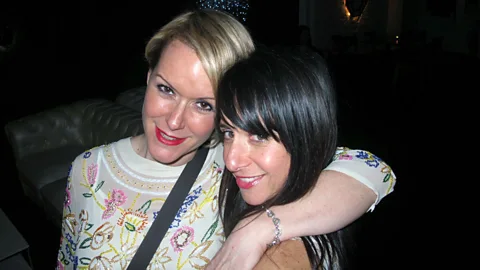The single mums who live together on ‘mommunes’
 Colleen Hegarty
Colleen HegartyCould the increasing prevalence of co-living arrangements for single mothers help provide a better environment for kids – and mums?
When Emily Blake first discovered she was pregnant at 34, her flatmate told her they could carry on living together. But when baby Jaden arrived, his crying and feeding schedules, and Blake’s sleepless nights, began to take a toll on her once-agreeable living arrangement.
“It can be difficult living with kids for someone who doesn’t have them,” she says.
After leaving her flat, Blake, now 35, didn’t have a home of her own for the better part of a year. She slept in a friend's spare room for several months before saving enough to put down a deposit on a house, aided by a housing start-up. But even then, she knew she’d have to divide the rent and bills with others to be able to afford the expenses of keeping a house – and it was difficult to find housemates who were comfortable living with a single mother with young children.
An internet search led her to CoAbode, a website that connects single mothers looking for shared accommodation. CoAbode was founded by Carmel Boss in 2002, after her own marriage ended and she had to raise her seven-year-old son in Los Angeles on her own.
“As a new single mom I felt lonely and doubtful about raising my son on my own,” says Boss. “Where was my tribe, my village?”
Boss put out an ad in a local paper for another single mum to share a home with. When 18 women responded she knew she was on to something. The pooled resources and emotional support that came from living with another single mother was something that mums were craving – and, throughout the past two decades, she says that hundreds of thousands of mothers have signed up on the site to find a housing match, including Emily Blake.
In late July Blake picked up the keys for a five-bedroom home in Central Alemeda, an area of Los Angeles in California. There she and three mothers and their children will make their own ‘mommune’.
Video by Colleen Hagerty.
Starting a ‘mommune’
Mommunes, a play on the word ‘communes’, are part of a trend of changing living situations as the traditional nuclear family structure evolves.
There are currently 15 million single mothers in the US, according to a 2018 paper from the PEW Research Center. The prevalence of single-mother families has more than doubled since the 1960s, rising from approximately 12% in the 1960s to 21% now.
Several factors have contributed to this increase, including decreased social stigma associated with divorce, a higher number of mothers leaving unhealthy relationships and more workplace opportunities that have enabled single mothers to find financial stability.
Still as the number of single mothers increases, many of the issues associated with being a single caregiver also amplify. For instance in the US, single mothers are the group most likely to suffer from poverty: 30% of solo mothers and their families are living in poverty, compared to only 8% of married couple families, according to 2018 statistics from the US Census.
In other words, it’s getting too expensive for many single mums to live on their own, which is why cohabitation is “the way of the future”, according to Blake Reed, co-founder of Roommates with Kids, which connects single parents looking to share housing.
As of its May launch, Reed says at least 70% of the 6,500 members at Roommates with Kids are single mothers. Since placement in a strong school district depends on your post code, he believes mothers benefit from sharing the costs to live in neighbourhoods that allow their children better access to education.
Reed also notes that privacy is a strong draw to websites such as Roommates With Kids and CoAbode, which both keep identifying information secret. “Mothers email me all the time saying, ‘Thank God, I don’t have to go on Craigslist anymore’."
 Colleen Hegarty
Colleen Hegarty‘I wanted a village’
For Emily Blake, creating a shared home with other single mums was about far more than financial security: she wanted emotional support from others in a similar position to her own.
“I don’t have a lot of family so I wanted a village for my son. I want to share some of the responsibility, but also the joy,” she says.
Although some friends and family have commented that Blake’s new living situation is strange, she is excited about the possibilities it holds. She plans to put down grass turf in the garden for the kids to play. Most of the children will share one room so that the mums can have their own rooms. And she’s looking forward to figuring out a babysitting schedule so that each mother can go out for some ‘me’ time
The emotional support network Blake and her fellow mums are building is important to combat disadvantages that some mothers who are raising children alone may face. Several studies across the globe have shown that single mothers are at greater risk for physical and mental health disorders compared to married mothers. A 2018 study showed that 33% of the single mothers studied experienced depression while only 8% of the control group showed depressive symptoms. This was attributed to economic hardship and lack of support.
Researcher Issar Daryanani has studied the way single motherhood affects children, and his research also suggests that low socioeconomic status negatively impacts parenting and the mental health of both mother and child.
A mommune was the perfect, supportive arrangement for Janet Hoggarth, who also shared her home in London with another single mum.
After her divorce in 2009, Hoggarth found herself raising three children under the age of six in a house by herself. Her friend, Vicki Hillman, was in a similar position with a new-born after she split from her fiancé. When Hillman sold her house, Hoggarth told her she could move in for a couple of months until she got her own place.
“I was utterly bereft that my husband had walked out and so were the kids, so having another person living with me who felt the same was so supportive,” Hoggarth, now 49, says. The situation helped both the mums and the kids “deal with the heartbreak in an environment where venting was allowed and long explanations unnecessary”.
No one else but Hillman understood their arrangement as the pair planned outings, parties and meals together. The two had another single mother friend who lived close by who joined them at weekends.
“It made me feel whole again, less mental, less exhausted,” she says. The situation worked so well for the two mums that they ended up living together for two years, and Hoggarth even wrote a book about it, The Single Mums' Mansion. “We formed our own alternative family unit.”
 Janet Hoggarth
Janet HoggarthSingle women taking charge
Shared housing for single mothers isn’t a blanket answer for all families, but it can be helpful for those who are looking to change the environment both for their children and themselves.
Single-mother families are understudied, but R Kelly Raley, a professor of sociology at the University of Texas at Austin, says that family stability is key to children’s wellbeing – perhaps regardless of family structure. However, Raley caveats that set-ups like mommunes are not an answer for everyone, since short-term arrangements could cause instability problems for children, “who flourish in stable homes and with consistent relationships”.
And, of course, “not all families will be a good fit for others”, says researcher Daryanani – a key to creating the right, nurturing environment.
Still, finding the right match could provide a lot of benefit to single mums, according to former mommune members. For example, Hogarth and Hillman have since moved on separately, but Hogarth still revels in how her children thrived in the shared environment. “The kids loved it. They were the ones missing having another grown-up there. They needed that reassurance,” she says. But she liked being part of something, too.
And in Los Angeles, Blake is excited about her future in her own mommune. She has financial support, an emotional safety net and a group of housemates she is looking forward to sharing a life with.
“In the 1950s you almost had to have a man,” she says, “and now all these single women are taking charge.”
